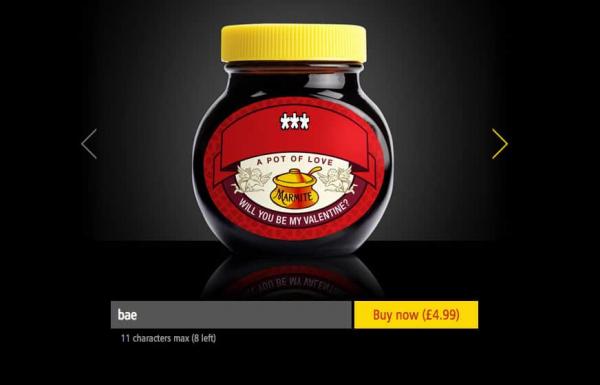
The Marmite Food Co. wants to make your Valentine's Day extra special by allowing you to order jars of its yeast-extract product with your significant other's name on it.
But there's a catch: Not all names work.
The company, which allows users to enter their lover's name along with a message that signifies their love, has specifically banned three words from buyers to use: "bae," "snookums" and "baby cakes."
"In the event that you attempt to ruin your lovely new jar of Marmite with stomach-curdling pet names, your attempt will be duly denied," the website reads. "Marmite recently commissioned research to find the nation's most hated pet-names and consequently the top three terms 'Bae', 'Snookums' and 'Baby Cakes' have all been banned from the personalisation service."
The penalty? You can't buy a jar of Marmite. Trust us. We tried:
Users can still use their 11 characters for other pet names, though, like "baby," "babe" and "sweetie pie."
But the company doesn't recommend it, especially since Marmite, a salty and dark brown food paste in the United Kingdom and Australia, is usually consumed at breakfast, and pet names may provide a bad start to your morning.
"We appreciate that Marmite is a spread best enjoyed at breakfast, and nobody wants a side helping of nausea first thing in the morning, so we thought it made perfect sense to ban the most hated pet names," the company's brand manager Philippa Atkinson, told The Drum. "Who knows, we may even be responsible for saving some relationships along the way."
Not exactly, Marmite. See, pet names have been noted to be healthy for relationships, and may offer a clue into how we as humans handle our romantic endeavors.
Pet names are nothing new in today's society. Couples will often use these different terms to show signs of affection and as terms of endearment. They range from the cliche - baby, bae, sweetpea - to the absurd, like "ponds-fish" or "Loppy Lop," as Elizabeth Landau highlighted in a piece for the Scientific American.
Pet names for couples aren't strictly American, either. The French, known for their romantic culture, also have created pet names for their partners, Landau wrote.
These pet names often act as more than just terms of endearment, but are also often a reflection of how much people enjoy their relationships. In a 1993 study, Carol J. Bruess and Judy C. Pearson looked at how nicknames can affect relationships, and found that relationships often have mini-cultures within themselves, where there are rituals, private languages and ceremonies that only couples understand. This can be seen in modern culture through pet names, inside jokes and ongoing types of dates.
"I think it's a really human, natural behavior to take language and shape it for our own purposes," Bruess told Scientific American."I think that's how nicknames evolve. We name things, we give things symbols, and over time we tend to naturally manipulate those symbols toward a certain outcome."
For many couples, these pet names prove to have a positive effect. Couples, especially those who have been in a relationship for a long time, recognize these names to be special, which become "part of the fabric of their relationship," Breuss said.
The study, which had students from Ohio State University fill out surveys on relationships, found there's a strong link between relationship satisfaction and having pet names - mostly because those names are goofy and lessen the tension between couples.
"If we can't laugh at ourselves and with each other in the relationship, we're less likely to sustain that relationship in a positive way over time," Bruess told Scientific American.
Still, not everyone is down with using pet names for their children. As New Republic's Alice Robb wrote, some couples will avoid using nicknames because they sound weird - like referring to your partner as a "baby," which is its own thing. Others find some nicknames demeaning, like reducing your romantic partner to a single word like, "babe," Robb wrote.
But most experts still find it healthy for couples to use nicknames since they are a sign of intimacy and closeness, which often can't be measured by any other method.
"Pet names are a kind of cue to intimacy," Ian Kerner, an author on relationships, told Robb. "They speak to the intimacy in a relationship. When couples stop using baby names, it's often an indication of a lack of intimacy."

